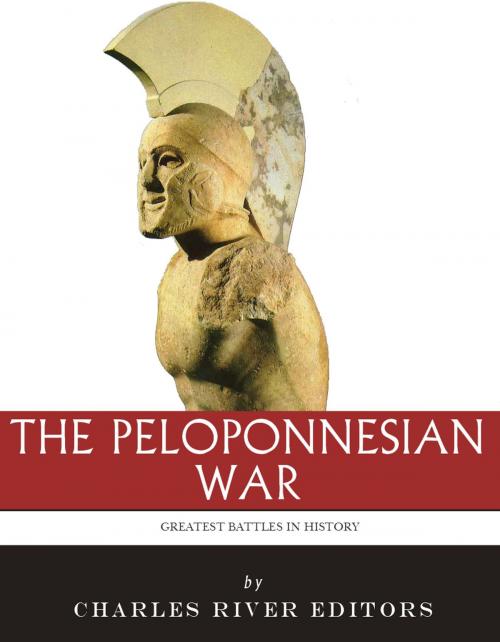| Author: | Charles River Editors | ISBN: | 9781475320817 |
| Publisher: | Charles River Editors | Publication: | January 1, 2013 |
| Imprint: | Language: | English |
| Author: | Charles River Editors |
| ISBN: | 9781475320817 |
| Publisher: | Charles River Editors |
| Publication: | January 1, 2013 |
| Imprint: | |
| Language: | English |
Thucydides, an Athenian, wrote the history of the war between the Peloponnesians and the Athenians, beginning at the moment that it broke out, and believing that it would be a great war and more worthy of relation than any that had preceded it. This belief was not without its grounds...Indeed this was the greatest movement yet known in history, not only of the Hellenes, but of a large part of the barbarian worldI had almost said of mankind." Thucydides, History of the Peloponnesian War The Peloponnesian War, as the great historian Thucydides wrote in the introduction to his eponymous book, which has become one of the greatest historical treatises of antiquity, was an event of such calamitous magnitude that Greece had never witnessed its like in all of recorded history. Not the Trojan War, not the Dorian Invasion, not even the recent Persian invasions which had devastated mainland Greece and seen Athens herself evacuated and put to the flame, the buildings on her Acropolis razed into dust could compare to the scale of the devastation that engulfed all of Greece for almost three decades, causing the deaths of tens, perhaps hundreds of thousands. Entire populations were displaced, whole cities destroyed, and mountainous sums of money spent, all in order for Greeces two most famous city-states to establish who had dominion over Greece. Sparta, whose invincible armies had recently led the Greeks to victory against Xerxess hordes at Plataea was at the head of the Peloponnesian League. Their opponents were led by proud Athens, possessor of a fleet that virtually dominated the entire Mediterranean and decimated the Persian navy at Salamis and Mycale, at the head of the Delian League. Sparta was insular and old-fashioned, while Athens was dynamic and democratic, but both were bent on imperialistic expansion, and the two ancient rivals, at loggerheads for so long, eventually sucked every other major city-state in Greece into the war. The Peloponnesian War would rage on a scale that was unimaginable to the Greeks, ranging from Italy to Asia Minor. By wars end, nothing would be the same and nothing would be sacred. Even the Spartans, the proud vanquishers of the Persian hordes, whose king Leonidas and his Three Hundred had died to the last man at Thermopylae to help preserve Greek freedom, were forced to go cap in hand to the Persian emperors and beg for money to continue the war. The war between Athens and Sparta was a war of nations, and it lasted so long that many who were alive and well at its beginning were dead of disease and old age quite apart from the hazards of the battlefield by its finish.The Greatest Battles in History: The Peloponnesian War comprehensively covers the history behind one of the most famous wars of antiquity, the men who led and fought in the war, and the wars lasting legacy. Along with a bibliography, maps, and pictures of important people and places, you will learn about the Peloponnesian War like you never have before.
Thucydides, an Athenian, wrote the history of the war between the Peloponnesians and the Athenians, beginning at the moment that it broke out, and believing that it would be a great war and more worthy of relation than any that had preceded it. This belief was not without its grounds...Indeed this was the greatest movement yet known in history, not only of the Hellenes, but of a large part of the barbarian worldI had almost said of mankind." Thucydides, History of the Peloponnesian War The Peloponnesian War, as the great historian Thucydides wrote in the introduction to his eponymous book, which has become one of the greatest historical treatises of antiquity, was an event of such calamitous magnitude that Greece had never witnessed its like in all of recorded history. Not the Trojan War, not the Dorian Invasion, not even the recent Persian invasions which had devastated mainland Greece and seen Athens herself evacuated and put to the flame, the buildings on her Acropolis razed into dust could compare to the scale of the devastation that engulfed all of Greece for almost three decades, causing the deaths of tens, perhaps hundreds of thousands. Entire populations were displaced, whole cities destroyed, and mountainous sums of money spent, all in order for Greeces two most famous city-states to establish who had dominion over Greece. Sparta, whose invincible armies had recently led the Greeks to victory against Xerxess hordes at Plataea was at the head of the Peloponnesian League. Their opponents were led by proud Athens, possessor of a fleet that virtually dominated the entire Mediterranean and decimated the Persian navy at Salamis and Mycale, at the head of the Delian League. Sparta was insular and old-fashioned, while Athens was dynamic and democratic, but both were bent on imperialistic expansion, and the two ancient rivals, at loggerheads for so long, eventually sucked every other major city-state in Greece into the war. The Peloponnesian War would rage on a scale that was unimaginable to the Greeks, ranging from Italy to Asia Minor. By wars end, nothing would be the same and nothing would be sacred. Even the Spartans, the proud vanquishers of the Persian hordes, whose king Leonidas and his Three Hundred had died to the last man at Thermopylae to help preserve Greek freedom, were forced to go cap in hand to the Persian emperors and beg for money to continue the war. The war between Athens and Sparta was a war of nations, and it lasted so long that many who were alive and well at its beginning were dead of disease and old age quite apart from the hazards of the battlefield by its finish.The Greatest Battles in History: The Peloponnesian War comprehensively covers the history behind one of the most famous wars of antiquity, the men who led and fought in the war, and the wars lasting legacy. Along with a bibliography, maps, and pictures of important people and places, you will learn about the Peloponnesian War like you never have before.















